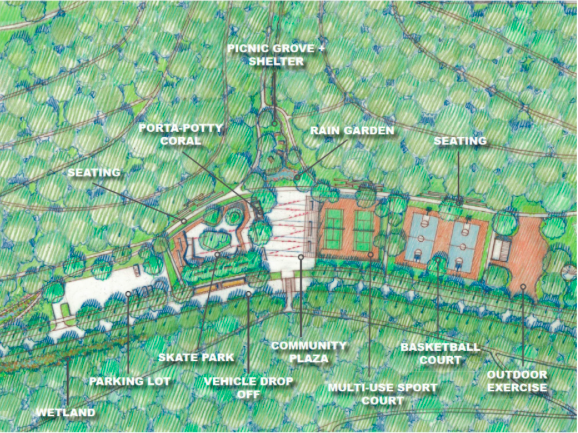McKinley Park
Revitalizing a historical community park through stormwater management

Integrated Urban Ecosystems
In the heart of Pittsburgh, McKinley Park, a 79-acre community park, is undergoing a transformation that is reconnecting communities with their natural heritage.
McKinley Park, with its challenging steep topography and history of erosion and flooding, is being reborn as a multifunctional ecosystem. Flood-prone areas are evolving into natural water management systems through stormwater design, nurturing the Saw Mill Run watershed, a critical focus for Pittsburgh's water authorities. Stormwater management isn’t just about water, fixing erosion or preventing floods in the park, it enhances biodiversity, community connections, recreation, and boosts neighborhood safety and resilience. By restoring wildlife habitats and flora, the project is reducing ecological isolation. New trails, reconfigured amenities, and 'complete streets' are being created, weaving the community back into the tapestry of nature.
The adjacent Haberman Corridor is being reimagined as a green artery and pedestrian corridor pumping life into the adjacent neighborhood by connecting McKinley Park to a transport hub. Underused spaces like adjacent housing, vacant lots, paths, steps, and forgotten alleys, are being reintegrated into the urban fabric, creating a vibrant, connected urban space. It's catalyzing housing rehabilitation and creating new recreation opportunities. The project recognizes that a park isn't an island, and speaks to the wisdom of working with what exists, rather than always building anew.
This isn't just a park renovation; it's a reimagining of what urban spaces can be. What we're witnessing is more than just urban planning. It's a blueprint for the biodiverse, resilient cities of tomorrow. Every park, every street, and every neighborhood is an opportunity to cultivate a more connected world.








Our cities are not separate from nature.
FAQs
-
Pittsburgh, PA; 2015-2018
-
Design advisory committee, public outreach
-
Haberman Corridor Master Plan, McKinley Park Master Plan
-
Pfaffman + Associates, Pittsburgh Parks Conservancy, Pittsburgh Water & Sewer Authority, Department of City Planning City of Pittsburgh, ALCOSAN, Saw Mill Run Watershed Association
-
National Recreation and Park Association, American Planning Association
-
McKinley Park will get greener, with more gathering space, NextPittsburgh
McKinley Park Master Plan outlined, South Pittsburgh Reporter
Parks Conservancy to share $1.75 Million grant, Pittsburgh Post Gazette

